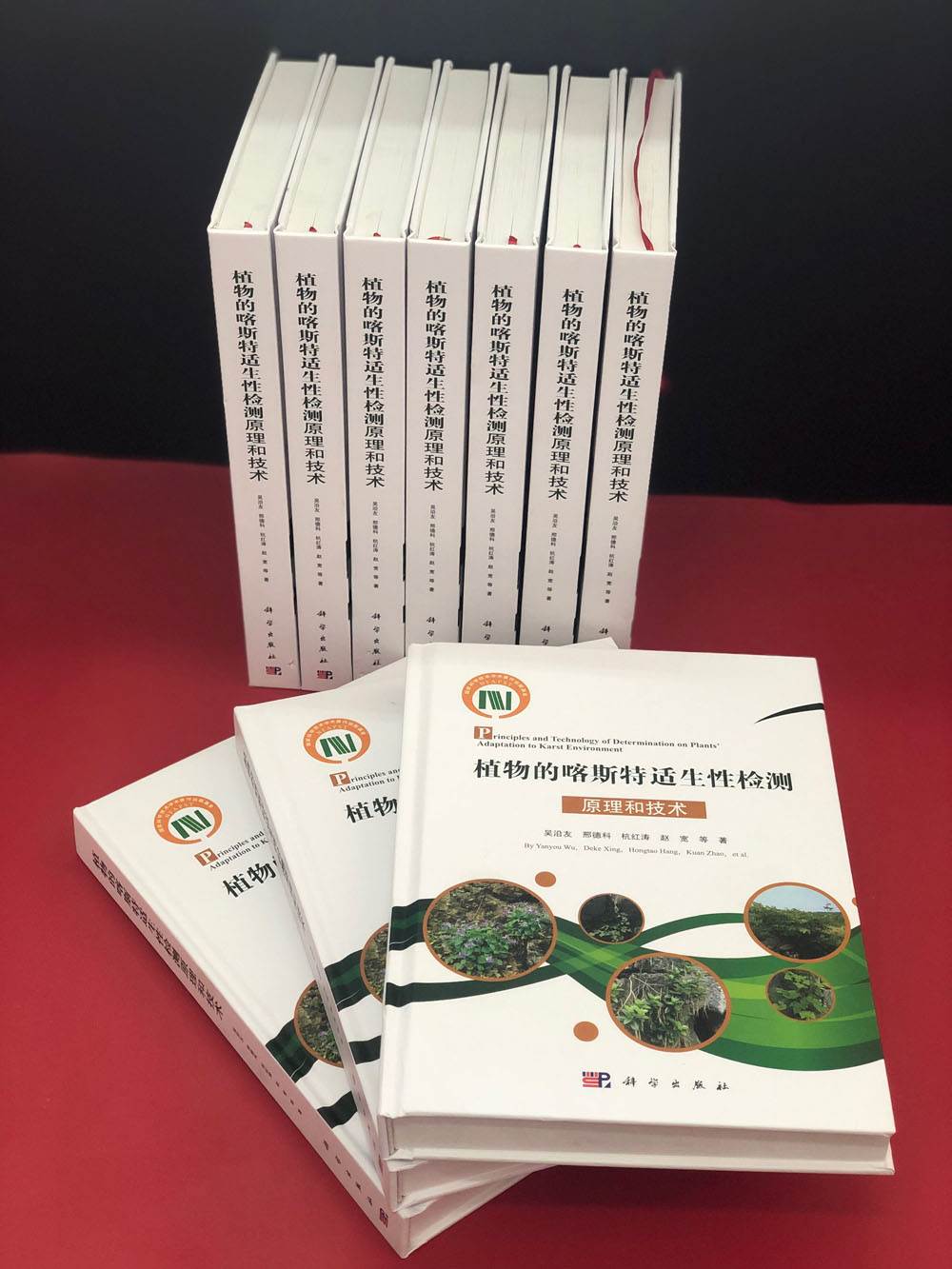A karst-adaptable plant is a plant that can adapt the typical karst environments such as karst drought, high concentration of calcium and bicarbonate, low nutrient, high pH, and so on. Karst-adaptable plants can regulate water, carbon and nutrient cycles, and hence increase the stability of ecosystem. Exploitation and utilization on karst-adaptable plants resources can accelerate the vegetation restoration in karst desertification areas, improve forest resources management, beautify karst landscape, and then contribute to the realization of sustainable development.
However, what kinds of plants can adapt to the specific karst environment? The team led by Professor WU Yanyou from the State Key Laboratory of Environmental Geochemistry (SKLEG), Institute of Geochemistry, Chinese academy of Sciences (IGCAS), finally figure out the answer based on their systematic research and exploration over the past 20 years.
Recently, the monograph, Principle and Technology of Determination on Plants' Adaptation to Karst Environment (ISBN 978-7-03-059386-3), which summarizes the relevant scientific research achievement of WU’s team, is published by Science Press in China.
The book covers many disciplines including botany, plant ecophysiology, geochemistry, geography, molecular biology, and environmental science. It demonstrates the adaptive mechanisms of the karst-adaptable plants by analyzing the karst soil characteristics, plant morphological characteristics, physiological and biochemical pathway complexity of the plant, and diversity in ecological adaptability. Based on the principle of determination on the plants’ adaptation to karst environment, WU’s team has developed a series of key measurement technologies, which can be shown as a typical example of applying basic theoretical research into practice. The book can provide guidance on the vegetation selection for the treatment and restoration in the fragile karst environment.
The monograph includes eight chapters. Chapter 1 elaborates the adaptive mechanism of the karst-adaptable plants and the role of plants’ adaptation to karst environment in ecological restoration in karst areas.
Chapter 2 demonstrates the characteristics of carbonic anhydrase in response to karst environment, and discusses the measurement technology of plants’ adaptation to karst environment based on the action mechanism of carbonic anhydrase in plants.
Chapter 3 compares the difference of bicarbonate utilization among plants under different karst adversity, and explores the method of determining the plant’s adaption to karst environment according to the plant’s ability of bicarbonate utilization.
Chapter 4 studies the factors of water, cell tensity, chlorophyll fluorescence, and the change of root-exuded organic acids of plants under drought stress, and then explores the method of measuring the plant’s adaption to karst environment based on those factors.
Chapter 5 investigates how to determine the low-nutrient tolerance of plant based on its physiological response and ion absorption kinetics characteristics. In addition, the chapter explores the measurement technology of the plants’ adaption to karst environment based on the plants’ nitrate utilization, and develops the method of measuring the resistance to low phosphorus in plants according to the characteristics of root-exuded organic acids.
Chapter 6 reveals the proportional variation in photorespiration, glycolysis, and pentose-phosphate pathway in plants under different adversity, and then explores how to determine the plants’ adaptation to karst environment based on the photosynthetic growth power and the regeneration ability of ribulose 1, 5-bisphosphate.
Chapter 7 and Chapter 8 examine the plants’ physiological response to adversity and then propose the comprehensive approaches to evaluate the plants’ adaptation to karst environment, under lab conditions and in natural habitats, respectively.
The monograph is specifically funded by the Chinese National Fund for Academic Publication in Science and Technology. It also obtains the funds from the Ministry of Science and Technology, the National Natural Science Foundation of China, the Chinese Academy of Sciences, the department of science and technology in Guizhou province, and many other departments.
 |
| The monograph,Principle and Technology of Determination on Plants' Adaptation to Karst Environmentis published. (Image by IGCAS) |
Contact:
WU Yanyou
Institute of Geochemistry, Chinese Academy of Science
Email: wuyanyou@mail.gyig.ac.cn
(By Professor WU Yanyou’s group)